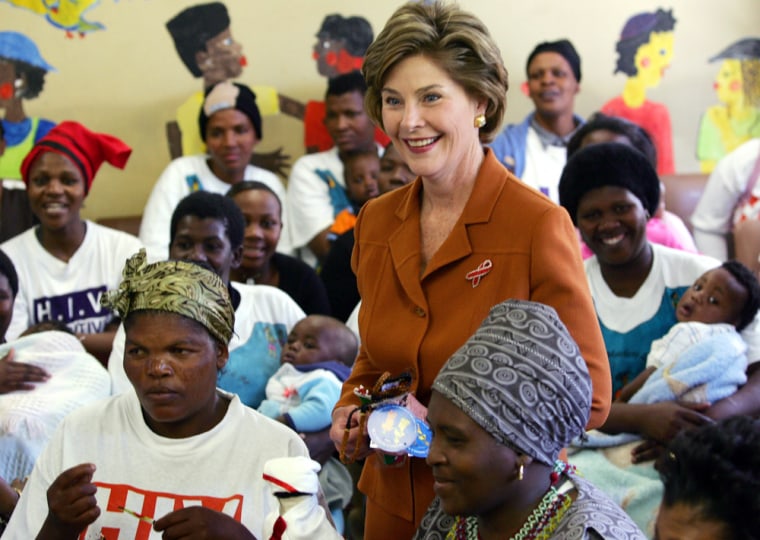Laura Bush praised HIV-positive mothers for working to wipe away the stigma attached to their disease and urged African women to take control of their sexual lives, talking candidly of sensitive topics Tuesday on her visit to Africa.
Bush’s day took her from her luxury hotel in glittering downtown Cape Town a short distance into the extremely poor Khayelitsha township, with its dusty streets and tin-and-tar-paper shacks — the site of protests over housing conditions the day before with roads blocked by burning tires.
Her motorcade appeared a curiosity but not a major attraction as it sped through Khayelitsha with screaming police escort. She was greeted exuberantly inside the health complex she was visiting.
Dozens of AIDS-infected mothers — some wearing T-shirts with huge “HIV Positive” logos, many with babies strapped to their backs — danced and ululated as the first lady entered the room, belting out a song of praise for her and America in their native Xhosa.
Halting transmission to babies
Bush came to the facility to showcase the work done there through The Mothers’ Programs, a private organization that receives some assistance through President Bush’s five-year, $15 billion anti-AIDS effort. Mothers who have kept from transmitting AIDS to their own babies are enlisted to coach expectant mothers to the same success.
“This has been very, very moving for me, and very inspirational,” Bush said, appearing to choke up, “to meet all the different people here, the different mothers who are helping other mothers, who are stripping away the stigma that goes with HIV/AIDS and living positive lives that are an inspiration to everyone.”
Of the 400 women who deliver babies at the complex’s Khayelitsha Maternity Obstetrics Unit each month, 28 percent of them have the virus that causes AIDS. But treatment at the facility has reduced transmission to their newborns to under 5 percent, said Dr. Keith Cloete, health director for the Western Cape province.
Bush’s stop in the country with the world’s highest number of AIDS cases did not bring all good news. She woke to a report in the local Cape Times newspaper that the number of AIDS sufferers in South Africa has grown. By the end of 2004, there were 6.2 million HIV-positive people out of a population of 47 million, up from 5.3 million a year earlier, according to a new report from the South African health ministry.
Tackling sexual inequality
Back in Cape Town later in the day, Bush spoke with women from several South African groups fighting against rape and domestic violence, a discussion that took several frank turns.
The women described the difficulty of providing effective education about how sexual equality intersects with the AIDS crisis in a country in which men leave their wives to find work in cities where they also find girlfriends, where men often view condom use as too much trouble, where women are treated as second-class citizens when it comes to sex, and where even longtime married couples may never have seen one another naked.
Bush, here to advertise a new three-year, $55 million proposal by her husband to provide legal protections for African women victimized by violence and sexual abuse, didn’t shy away from the difficult topic.
Saying that reducing sexual abuse and raising women’s profile are key to battling AIDS, she urged the women on in their efforts to help women “negotiate their sexual life in a way that protects them and protects their family.”
She added: “I like it that you’re not leaving the men out. They’re a very important part of it.”
